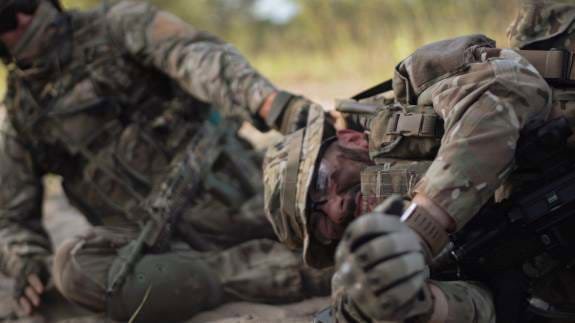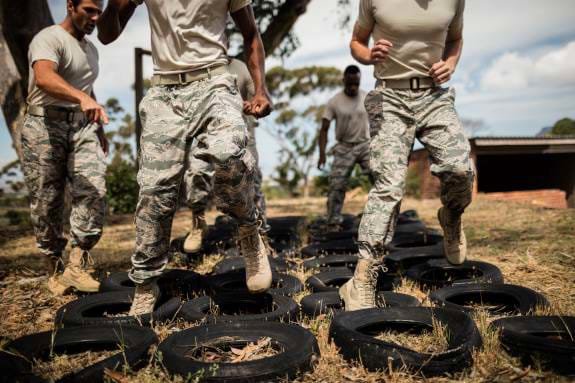Client Situation
Our client had been enjoying a successful career in the Army and had been on track for a promotion to the rank of Lance Corporal which would have also afforded our client with a significant salary and pension increase.
‘Probably the proudest day in a young soldier’s career is the day that they get promoted to Lance Corporal and receive their first stripe’
The British Armed forces deployed our client to take part in a survival training exercise in Garelochhead, Scotland. This exercise was to last for 2 weeks and would test the military service personnel’s resilience and adaptability as they master the principals of survival in the most difficult situations.
The military service personnel who took part in the 2-week survival training exercise had been subjected to sub-zero temperatures and extreme wet weather throughout the duration, with only basic military kit. It was during this exercise that our client suffered symptoms of numbness, tingling, pain and swelling in his hands and feet, a sign that he was experiencing symptoms of non-freezing cold injury (NFCI).
Although our client’s symptoms eased once the survival training exercise was complete and our client had been warmed up, his symptoms would return each time he was further exposed to cold and wet conditions. This further cold exposure would make further damage to his hands and feet more likely.
Whilst our client could continue with his daily activities at this time, and as his symptoms were manageable; our client didn’t want to jeopardise his military career, so he continued with his work without reporting his symptoms to the military’s medical services.
It was later, however, following a further military training exercise in Canada, where our client was once again exposed to extended periods at sub-zero temperatures, that his symptoms increased again. However, this time he found himself in the agonising state in which his symptoms were no longer improving once he had warmed up to normal body temperature.
It was now clear to our client that he had been exposed to multiple episodes of extended sub-zero conditions, causing severe and chronic symptoms in his hands and feet. It was at this point he felt he now had to report his symptoms to medical staff. They referred him to the Institute of Naval Medicine in Gosport for further tests and investigations to determine the extent of what was now a chronic condition.
Ultimately, he was diagnosed with Non-Freezing Cold Injury (NFCI), and he was left experiencing constant cold and numb sensations in his hands and feet, as well as frequently experiencing sensations of tingling and burning in these extremities.
Our client knew well that a diagnosis of Non-Freezing Cold Injury (NFCI) would ultimately mean the end of the military career that he had worked towards and decided to sign off.

How We Helped our client
Our team of expert Military Claims lawyers took on the case and agreed to help our client with his claim for compensation against the Ministry of Defence.
Our team collected detailed witness statements from our client, and from former service colleagues, dealing with the circumstances that led to his Non-Freezing Cold Injury (NFCI).
An expert vascular surgeon was instructed, who carried out a full examination of our client and prepared a detailed medical report on our client’s condition, continuing symptoms and future prognosis.
Our team also instructed a firm of employment consultants all of whom were ex-UK military officers. We tasked them with preparing a report addressing our client’s military career, and the career path he would likely have followed in the military had he not been injured and diagnosed with life altering NFCI condition. The report also identified how our client's NFCI diagnosis would also affect his future career options as a civilian.
Once they had constructed a detailed and comprehensive case, our team issued court proceedings against the Ministry of Defence. The claim for our client comprised compensation for his Non-Freezing Cold Injury (NFCI), as well as past and future loss of earnings, loss of military pension, and additional costs and expenses including heating and clothing.
The Ministry of Defence denied liability for the NFCI and argued that our client had chosen to resign rather than to be discharged on medical grounds.
How did we get a good outcome for our client?
Despite many attempts to resolve the case outside of the courts, the Ministry of Defence continued to deny all responsibility, and it looked increasingly likely that the case would have to go to trial
However, close to the trial date, a last-minute settlement meeting was requested, and our highly skilled team of Military Claims Lawyers successfully argued our client’s case for compensation for his Non-Freezing Cold Injury, his loss of past and future earnings, and his loss of military pension.
The Ministry of Defence eventually agreed to settle out of court and to pay our client a sum of £400,000 in compensatory damages.
This was a monumental win for our client, and for our military claims lawyers.
Have you been diagnosed with Non-Freezing Cold Injury (NFCI) whilst serving in the British Armed Forces?
This certainly isn’t an isolated case for military personnel. According to government figures between 1 January 2010 and 15 March 2022, 4,925 UK regular armed forces personnel had Non-Freezing Cold Injury (NFCI) entered in their electronic medical records. It is estimated that in the last decade, legal teams across the UK have brought over 500 negligence claims against the MOD for NFCIs.
Many of these Non-Freezing Cold Injuries (NFCI) are preventable, and the MoD has now created its own guidance on how the British Armed Forces must work to reduce cold injuries during outdoor training exercises. This includes simple steps such as:
- Providing the right cold weather equipment, shelter and clothing
- Immediately referring those with symptoms to a Medical Officer
- Monitoring weather conditions, temperatures, and cancelling exercises when risks are increased
- Training all Service Personnel and particularly Officers who organise outdoor exercises
It is clear that if a soldier has been negligently exposed to weather conditions which caused him or her to develop Non-Freezing Cold Injury, the Ministry of Defence (MOD) ultimately has a responsibility for this.
Would you like to speak with one of our Military Claims Specialists?
Military service personnel and veterans in the UK can make civil claims for compensation against the Ministry of Defence (MoD) if they have been injured as a result of negligence. Examples of negligence can include:
- Failing to provide proper equipment and clothing.
- Failing to provide sufficient training on the signs and symptoms of NFCI.
- Ordering service personnel to undertake unnecessary risks during training exercises.
- Failing to provide proper medical care and treatment for injuries – military medical negligence.
To speak to one of our Military claims lawyers please fill in your details and one of the team will call you back, or if you need to speak immediately please call us on 0800 260 5010.










